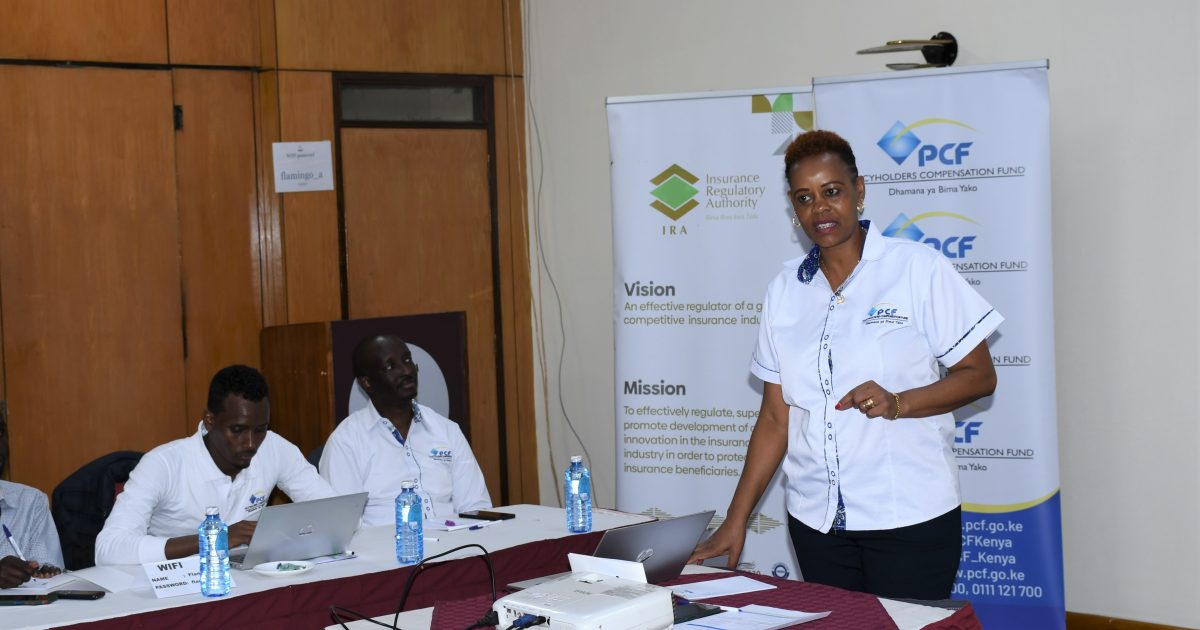A total of 733 Policyholders of the collapsed Resolution Insurance Company and Standard Assurance Limited have received Sh 83,180,000 payouts from the Policyholders Compensation Fund (PCF).
The Resolution Insurance Company is under statutory management of PCF while Standard Assurance Limited is currently under liquidation.
The Fund has disclosed that it has so far compensated 724 claimants of Resolution Insurance Company with Shs 82.21 million, while nine previous shareholders of Standard Assurance Company had already received Shs 1.95 million as at June 30, 2023.
Deputy Director Corporate Communications Ms Rosemary Kavili however expressed concern that most former clients of the two collapsed underwriters were unaware that they were entitled to immediate compensation from the fund following a change in law that paved the way for payment to policyholders immediately an insurance company goes under.
Ms Kavili said they have rolled out a sensitization engagement programme targeting the 47 devolved units that is aimed at enlightening members of the public that the fund is compensating claimants for all insurance companies declared insolvent and whose liquidation process has been cleared by the courts.
The Deputy Director explained that the decision to establish the fund was a key initiative in the reform of the insurance sector. Its primary purpose, she added, is to protect policyholders of insolvent insurance companies by compensating them.
The sensitization drive dubbed ‘PCF Mtaani” is currently being carried out in Nakuru for a week after being rolled out in Uasin Gishu and Embu counties. It is bringing on board media practitioners, Insurance agents, Boda Boda operators, matatu owners and other stakeholders.
Ms Kavili who was flanked by Deputy Director in charge of Risk Monitoring Mr Moses Kiptoon further disclosed that all the 45 claimants of Concord Insurance Limited had been paid a total of Shs 9.02 million since its collapse in 2013.
“We want to inform Kenyans that PCF is domiciled at the National Treasury and the State Department for Planning. This sensitization drive is to enhance our visibility. Our core mandate is to compensate claimants of an insurance company which has gone under or whose license has been cancelled or withdrawn,” she added.
Ms Kavili pointed out that claimants should fill the necessary forms with supporting documents and submit the same to PCF for verification and payment.
The fully completed claim compensation form should be supported by evidence of an existence of a claim with the company (claim form), evidence of quantum of the claim (Discharge Voucher or a Decree/Court Award in case of Third-Party Claimants).
Mr Kiptoon said compensation to policyholders of the two underwriters is currently capped at Sh250,000 for each client in accordance with the law.
Creditors and policyholders with higher value claims will wait for the liquidation of the business to see how much more they can recover.
Mr Kiptoon said PCF has put in place an elaborate framework to ensure the successful implementation of the Compensation of policyholder claims.
Standard Assurance Company was placed under statutory management on March 11, 2009 after running into serious operational and financial difficulties making it unable to meet its obligations as an insurer.
The company was unable to settle Shs 100 million in outstanding claims owed to policyholders and creditors as well as payment of levies as prescribed in the Insurance Act.
The Sh103.5 million borrowed by insiders at the firm exceeded the Sh100 million the shareholders failed to inject into the firm to keep it afloat, leading to its placement under statutory management.
Documents filed before the High Court named the firm’s former general manager Elijah Adul, its majority shareholder Wilson Kipkoit, and companies associated with him as having borrowed more than Sh103.5 million from the firm in breach of insurance regulations that bar directors and executives from borrowing more than Sh20,000.
“Although the accounts show a petty cash balance, no cash was actually in existence,” stated the court documents.
The court documents show that the brokers and agents of the insurance firm failed to remit premiums worth Sh396.7 million to Standard Assurance Kenya despite having received the monies from the policyholders.
This denied the company the financial muscle it required to fund its operations, boost its underwriting profits and create a larger investment fund that could have churned out outsized returns from investments such as property and shares.
Last year the Commissioner of Insurance appointed PCF as the Statutory Manager of Resolution for a period of 12 months.
When PCF took over as Statutory Manager the underwriter had collected over Sh6.5 billion in client cash, insurance claims, and creditor funds after its shareholders failed to recapitalize the business.
The Insurance Regulatory Authority (IRA) said the insurer had also collected Sh4.1 billion in premiums from policyholders out of which 90 percent were medical customers.
The firm also owed creditors and had claims from the insurance business totalling Sh2.5 billion, an indication of the long list of clients and suppliers eager to recover their funds from the failed insurer.
On April 5, 2022, the Insurance Regulatory Authority said the company has been facing a number of challenges particularly relating to its ability to meet its obligations and mitigate its inherent risks thereby inviting the Commissioner to intervene on several occasions.
“Despite the various intervention measures taken as provided for by the Insurance Act, Resolution Insurance Company Limited has continued to slide into operational and financial difficulties.
In particular, the company is not able to settle claims to the detriment of claimants, policyholders and other creditors. The insurer is also not able to comply with statutory requirements relating to capital adequacy, submission of returns and governance structures,” reads an excerpt of the statement.
Additionally, the authority said it had had numerous engagements with the management and board of the insurer to seek solutions to salvage the company. However, all the measures had not been successful.
“Resolution Insurance Company Limited is from now henceforth not authorized to transact any new insurance business.”
Documents filed in Court in June last year by PCF revealed that at least Sh. 3.6 billion was required to bring back solvency in Resolution Insurance Company which included Shs 600 million minimum capital requirement for an insurer to transact general insurance business.
The Commissioner of Insurance revealed that after an analysis of the viability option of the insurer and inadequacy of shareholders’ revival proposal, the Statutory Manager recommended liquidation of the company.
Resolution’s clients with the biggest exposure included those who had insured high-value assets such as motor vehicles, houses, and industrial properties. Customers with medical bills also suffered as they had to pay out of pocket.
Resolution was founded by Peter Nduati and its collapse came after the company raised money from several investors and expanded into medical and general insurance business.
The company was initially a medical insurance provider (MIP), operating as both an insurer and broker, taking premiums for the less risky outpatient services and reinsuring the risky in-patient business with local insurers.
Legal changes ended the MIP business in 2012, a move that saw Resolution become a medical insurer and later move into general insurance.
Earlier investors of Resolution included African Development Corporation (ADC) which was later acquired by London-based Atlas Mara.
In one of its last transactions, UK-based Linkham Group acquired an unspecified stake in Resolution after buying out LeapFrog Investments.
Days to its collapse, the insurer suspended underwriting of general business which is short-term.
By Anne Mwale




